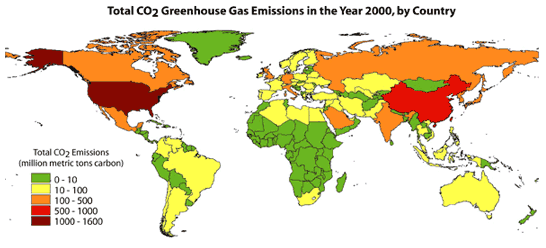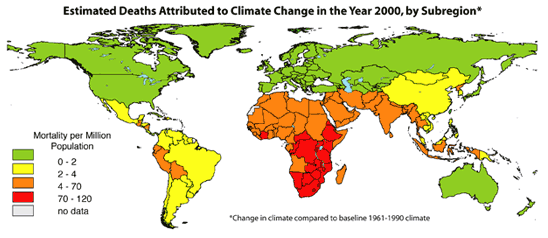Developing countries to suffer worst global warming impacts
By Paroma Basu
University of Wisconsin news release
November 18, 2005
In a recent chilling assessment, the World Health Organization (WHO) reported that human-induced changes in the Earth’s climate now lead to at least 5 million cases of illness and more than 150,000 deaths every year.
Temperature fluctuations may sway human health in a surprising number of ways, scientists have learned, from influencing the spread of infectious diseases to boosting the likelihood of illness-inducing heat waves and floods.
Now, in a synthesis report featured on the cover of the journal Nature, a team of health and climate scientists at UW-Madison and WHO has shown that the growing health impacts of climate change affect different regions in markedly different ways. Ironically, the places that have contributed the least to warming the Earth are the most vulnerable to the death and disease higher temperatures can bring.
“Those least able to cope and least responsible for the greenhouse gases that cause global warming are most affected,” says lead author Jonathan Patz, a professor at UW-Madison’s Gaylord Nelson Institute for Environmental Studies. “Herein lies an enormous global ethical challenge.”
According to the Nature report, regions at highest risk for enduring the health effects of climate change include coastlines along the Pacific and Indian oceans and sub-Saharan Africa. Large sprawling cities, with their urban “heat island” effect, are also prone to temperature-related health problems.
Africa has some of the lowest per-capita emissions of greenhouse gases. Yet, regions of the continent are gravely at risk for warming-related disease. “Many of the most important diseases in poor countries, from malaria to diarrhea and malnutrition, are highly sensitive to climate,” says co-author Diarmid Campbell-Lendrum of WHO. “The health sector is already struggling to control these diseases and climate change threatens to undermine these efforts.”
“Recent extreme climatic events have underscored the risks to human health and survival,” adds Tony McMichael, director of the National Centre for Epidemiology and Population Health at the Australian National University. “This synthesizing paper points the way to strategic research that better assesses the risks to health from global climate change.”
The UW-Madison and WHO assessment appears only weeks before global leaders convene in Montreal during the first meeting of the Conference of Parties to the Kyoto Protocol, which came into effect in February 2005. Patz will also deliver the keynote address at a parallel WHO/Health Canada event.
 This map shows total carbon dioxide emissions from fossil-fuel burning, cement production, and gas flaring for the world’s countries in 2000. Emissions are expressed in million metric tons of carbon. The map was created by a team of climate and health scientists led by Jonathan Patz, associate professor of environmental studies and population health sciences at UW-Madison. Map courtesy the Center for Sustainability and the Global Environment.  The health effects of global warming vary markedly at the regional scale. This map shows the estimated numbers of deaths per million people that could be attributed to global climate change in the year 2000. Drawing from data from the World Health Organization, the map was also created by Patz’s team. Map courtesy the Center for Sustainability and the Global Environment. |
The United States – the world’s top emitter of greenhouse gases – has yet to ratify the Kyoto treaty. Patz and his colleagues say their work demonstrates the moral obligation of countries with high per-capita emissions, such as the U.S. and European nations, to adopt a leadership role in reducing the health threats of global warming. It also highlights the need for large, fast-growing economies, such as China and India, to develop sustainable energy policies.
“The political resolve of policy-makers will play a big role in harnessing the man-made forces of climate change,” says Patz, who also holds a joint appointment with the UW-Madison department of Population Health Sciences.
Scientists believe that greenhouse gases will increase the global average temperature by approximately 6 degrees Fahrenheit by the end of the century. Extreme floods, droughts and heat waves, such as Europe’s 2003 heat wave, are likely to strike with increasing frequency. Other factors such as irrigation and deforestation can also affect local temperatures and humidity.
According to the UW-Madison and WHO team, other model-based forecasts of health risks from global climate change project that:
- Climate-related disease risks of the various health outcomes assessed by WHO will more than double by 2030.
- Flooding as a result of coastal storm surges will affect the lives of up to 200 million people by the 2080s.
- Heat related deaths in California could more than double by 2100.
- Hazardous ozone pollution days in the Eastern U.S. could increase 60 percent by 2050.
Aside from research and the needed support of policy-makers worldwide, Patz says individuals can also play an important role in curbing the health consequences of global warming. “Our consumptive lifestyles are having lethal impacts on other people around the world, especially the poor,” Patz says. “There are options now for leading more energy-efficient lives that should enable people to make better personal choices.”
Related articles
This is a modified news release from the University of Wisconsin. The original version appears at Third World bears brunt of global warming impacts.
Climate change means less water for western US by 2050, more for Montana – 17-November-2005
USGS scientists simulated the impact of future climate change on global water availability. By 2050, the models predict increased water runoff in eastern equatorial Africa, the La Plata basin and high latitude North America and Eurasia. They predict decreases in runoff in southern Africa, southern Europe, the Middle East and mid-latitude western North America. The authors of the paper, which appears tomorrow in Science, say climate climate will result in costly disruptions to water supply and resource management systems.
Coral reefs decimated by 2050, Great Barrier Reef’s coral 95% dead – 17-November-2005
Australia’s Great Barrier Reef could lose 95 percent of its living coral by 2050 should ocean temperatures increase by the 1.5 degrees Celsius projected by climate scientists. The startling and controversial prediction, made last year in a report commissioned by the World Worldwide Fund for Nature (WWF) and the Queensland government, is just one of the dire scenarios forecast for reefs in the near future. The degradation and possible disappearance of these ecosystems would have profound socioeconomic ramifications as well as ecological impacts says Ove Hoegh-Guldberg, head of the University of Queensland’s Centre for Marine Studies.
Massive climate change rocked ecosystems, animals 55 million years ago – 14-November-2005
Continued increases in greenhouse gas concentrations in the atmosphere from the combustion of fossil fuels could trigger large-scale changes in global biodiversity and require thousands of years of recovery according to recent research on an extreme global warming episode 55 million years ago.
Greenhouse gas emissions will rise by 52% by 2030 warns EIA – 7-November-2005
The International Energy Agency (EIA) today released a report projecting that global greenhouse gas emissions will rise by 52% by 2030, unless the world takes action to reduce energy consumption. Further, the IEA says that oil prices will rise “substantially” unless there is extra investment — $20.3 trillion in fresh facilities by 2030 — in oil facilities.
Global warming to fuel rise in asthma, malaria – 2-November-2005
The Center for Health and the Global Environment at Harvard Medical School, along with co-sponsors Swiss Re and the United Nations Development Programme, today released a study showing that climate change will significantly affect the health of humans and ecosystems and these impacts will have economic consequences.